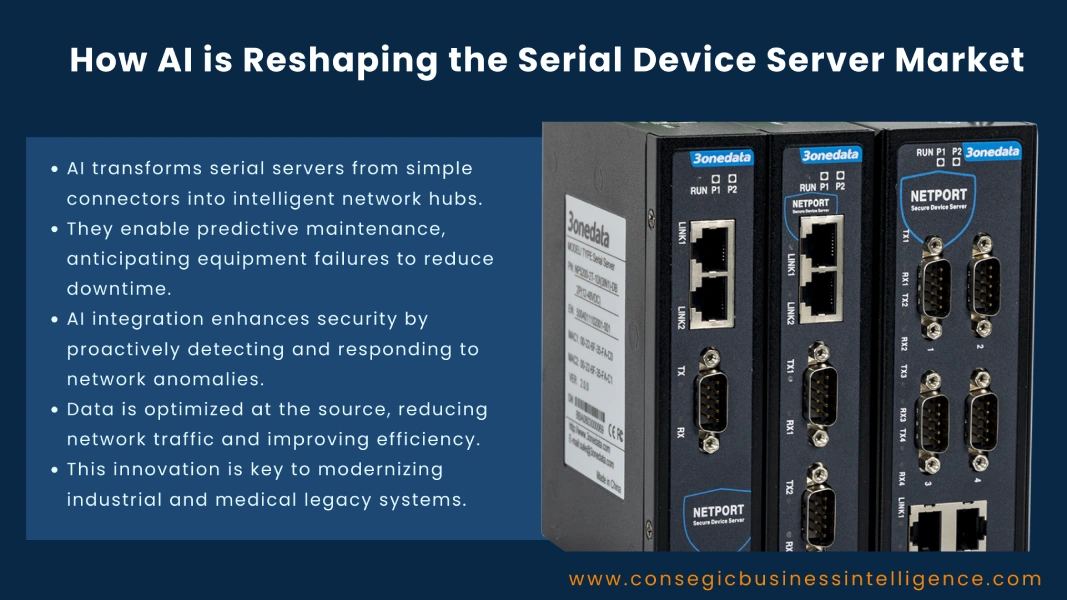How AI is Reshaping the Serial Device Server Market
The serial device server market has played a critical role in connecting serial-based equipment to modern networks. These servers act as gateways, enabling legacy devices such as sensors, industrial controllers, and medical equipment to communicate seamlessly with Ethernet and wireless networks. While traditionally used for simple device networking, the market is undergoing a significant transformation with the integration of artificial intelligence (AI).

Furthermore, AI is enabling serial device servers to go beyond basic connectivity by offering intelligence, automation, and predictive capabilities. Instead of simply transmitting data, they are now able to analyze, optimize, and secure communication in real time. This shift is revolutionizing industries ranging from manufacturing and transportation to healthcare and energy.
Here’s a look at how AI is reshaping the serial device server market.
- Smarter Data Management and Traffic Optimization
AI-driven serial device servers can now manage and prioritize data traffic more effectively. By analyzing communication patterns, AI ensures critical data receives priority while reducing network congestion. Moreover, this optimization is especially important in industries where downtime or delayed communication can disrupt entire operations, such as in power grids or automated factories.
- Predictive Maintenance and Equipment Monitoring
One of the most impactful applications of AI is predictive maintenance. Serial device servers connected to industrial machines can use AI algorithms to monitor equipment health, detect anomalies, and predict failures before they happen. This helps businesses reduce downtime, extend equipment lifespan, and lower maintenance costs. For industries like oil and gas or utilities, predictive maintenance powered by AI is becoming a game-changer.
- Enhanced Cybersecurity Capabilities
Cybersecurity is a growing concern for connected devices, especially with the rise of Industrial IoT (IIoT). AI enables serial device servers to detect unusual network activity, identify potential threats and respond in real time. Features such as intrusion detection and adaptive firewalls are now being integrated with AI, offering a stronger defense against evolving cyberattacks.
- Intelligent Protocol Conversion
Traditionally, serial device servers convert legacy protocols to Ethernet or TCP/IP. With AI, these conversions are becoming more adaptive and efficient. AI-based systems can automatically recognize device protocols, reduce latency during conversion, and optimize translation for faster communication. This allows companies to modernize legacy systems without expensive infrastructure replacements.
- Real-Time Decision Making in Industrial Automation
AI is giving serial device servers the ability to support real-time decision-making in industrial environments. For instance, servers connected to sensors in a production line can analyze incoming data instantly and trigger automated responses without waiting for centralized systems. This reduces delays and improves overall efficiency in automated manufacturing.
- Seamless Integration with IoT and Cloud Platforms
As IoT adoption grows, AI-powered serial device servers are being designed to integrate seamlessly with cloud systems and IoT platforms. Data collected from legacy devices can be processed locally with AI before being sent to the cloud, reducing bandwidth needs and enabling edge intelligence. This makes integration smoother and more efficient for smart factories and connected enterprises.
- Energy Efficiency and Green Operations
AI is also helping reduce energy consumption in connected systems. By monitoring usage patterns and adjusting performance, AI-powered serial device servers can minimize unnecessary energy usage. For example, idle ports or low-traffic periods can be detected, prompting the system to lower power consumption. This aligns with the broader push toward sustainability and eco-friendly industrial solutions.
- Remote Management and Autonomous Operations
With AI, serial device servers are becoming capable of autonomous operation. Remote management features now go beyond simple monitoring as AI can identify issues, apply corrective actions, and update firmware automatically. This reduces the need for manual intervention and lowers operational costs, particularly for companies managing large networks of devices across multiple locations.
- Improved Scalability for Expanding Networks
As enterprises expand, network scalability is crucial. AI ensures that serial device servers can handle growing volumes of connected devices without compromising performance. By dynamically allocating resources and optimizing traffic, AI makes scaling easier and more cost-effective, supporting industries that are rapidly digitizing.
- Industry-Specific Applications and Customization
AI-powered serial device servers are also enabling customization for specific industries. In healthcare, they can monitor medical equipment more reliably, ensuring compliance and patient safety. In transportation, AI helps optimize communication between traffic management systems and roadside devices. These tailored solutions are driving adoption across diverse verticals.
Conclusion
Artificial intelligence is transforming the serial device server market from basic connectivity tools into intelligent enablers of digital transformation. With capabilities such as predictive maintenance, enhanced security, and real-time decision-making, AI is elevating the value of serial device servers in modern networks. As industries continue to integrate IoT, automation, and cloud technologies, the role of AI-powered serial device servers will only grow stronger. Companies that embrace these innovations will benefit from smarter operations, reduced costs and enhanced reliability, positioning AI-driven serial device servers as a cornerstone of the connected future.
